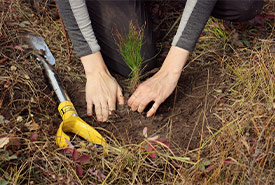NCC: Land Lines – The two-way street between a thriving environment and happiness

People spending time in nature (Photo by Joe McFarlane/iStock)
In the Carleton University happiness lab, our biggest line of research explores the idea that environmental sustainability can come via a happy path through nature. This seems especially relevant in the last couple of years, as the COVID-19 pandemic created well-being challenges and as our environmental problems become increasingly pressing. Many people coped with pandemic stress by turning to nearby nature, as indicated by a Nature Conservancy of Canada poll that put that figure at 94 per cent in 2020. We observed similar things in more intensive studies of Canadian students, and the strategy looked quite effective for happiness too.

Nature was the balm we’d needed after months of physical distancing and pandemic-related uncertainties (Photo by Christine Beevis Trickett/NCC staff)
Despite the pandemic challenges, many people’s well-being bounced back pretty quickly. We found that students who started spending more time in nature during the pandemic were happier than those who did not increase their time in nature. In addition to the actual time spent in nature, we assessed people’s subjective sense of connection with nature. People high in this “nature relatedness” tend to see themselves as more a part of nature, linked with shared experiences, evolution and ecosystems, and with feelings of closeness like in our human relationships. During the pandemic, highly nature-related people turned to nature even more than others; however, the benefits of spending time in nature did not depend on nature relatedness; they were enjoyed by new and old nature lovers alike.
My students and I tried to enjoy nature more during the pandemic, yet we remained cautious about conducting in-person studies, as there were new waves of infection and ever-changing guidelines. One way we adapted our research approach was by using a smartphone app to ask about people’s day-to-day experiences; that is, asking people the same questions many times over the course of a few weeks. This approach had some nice advantages, such as assessing participants where they are, rather than in a psychology laboratory or specific location chosen by the researcher. It also allowed us to look at changes over time, such as how a particularly good day looks different than a particularly bad day. We aimed this strategy at old and new research questions.
For example, people and media stories seemed increasingly concerned with eco-anxiety, or feeling upset about climate change and environmental destruction. This is an unpleasant experience, but it may also be manageable and perhaps even a useful discomfort. We found that most days did not bring high levels of eco-anxiety, even as almost everyone reported the experience at some point. Additionally, on days when people reported more eco-anxiety, they also reported engaging in more environmentally friendly behaviours.

Tree planting at Meeting Lake 03 (Photo by NCC)
We think people may have been coping with feelings of eco-anxiety by trying to do something about the root causes of environmental problems. This goes along with what nature-informed therapists have told us, and it seems like an example of the more generally effective category of problem-focused coping. So, even though environmental challenges are big and complex, taking individual action, even in small ways, seems to help both the environment and our anxiety about it.
This research also suggested a downside for people with strong nature relatedness; they reported more eco-anxiety. Fortunately, this extra anxiety was not enough to overwhelm the very consistent finding that nature-related people are generally happier. (Happiness is broad; while anxiety works against it, positive emotions and satisfaction can still win the balance.) Indeed, looking at daily reports shows that good days include some time in nature and when the subjective connection feels strong.

Person spending time in nature (Photo by Zen Chung via Pexels)
Doing nice things for the environment also may do more than ease eco-anxiety. We also found that the days when people did more environmentally sustainable behaviours (some with eco-anxiety and many without) were also happier days. Although pro-environmental behaviours are sometimes framed in terms of sacrifices, it seems like they could instead act as little mood boosters in daily life.
Doing nice things for the people we love tends to boost happiness; the same may be true for nature.




